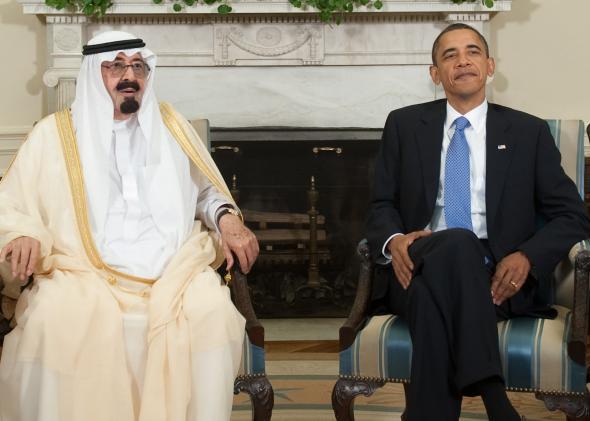While Israeli Prime Minister Benjamin Netanyahu wasted no time in letting the world know what he thinks of the Iran nuclear deal, the other regional power most concerned about the deal, Saudi Arabia, has been conspicuous in its silence. The Saudi leadership had publicly urged the U.S. “not to succumb to the president of Iran’s soft talk” in the runup to the deal and is almost certainly skeptical that the agreement reached will keep Iran from developing nuclear weapons. So the question becomes, what are they going to do about it?
David Sanger of the New York Times notes that, Saudi leaders have been “hinting in vague asides that if the United States cannot roll back the Iranian program, it may be time for Saudi Arabia to move to Plan B — nuclear weapons of its own, presumably obtained from Pakistan, which entered the nuclear club on Saudi subsidies.” U.S. critics of the deal have been discussing this scenario as if it’s now a fait accompli.
The prospect of a nuclear Iran setting off a Middle East arms race has been a concern for a while now, and I’d say Riyadh has actually gone beyond “vague asides.” According to cables released by WikiLeaks, King Abdullah himself warned in 2008 that if Iran went nuclear, “everyone in the region would do the same, including Saudi Arabia.” Prince Turki al-Faisal made the threat more publicly in 2011.
President Obama himself suggested in a speech at AIPAC last year that “It is almost certain that others in the region would feel compelled to get their own nuclear weapon, triggering an arms race in one of the world’s most volatile regions.”
However, it’s worth keeping a few things in mind. First, as Steve Cook wrote last year, Saudi Arabia “has no nuclear facilities and no scientific infrastructure to support them,” so building a bomb from scratch could be a long and daunting process.
But what if Saudi Arabia simply bought itself a nuke? A BBC Newsnight report earlier this month suggested that “nuclear weapons made in Pakistan on behalf of Saudi Arabia are now sitting ready for delivery” should the Saudis decide they want them.
In the midst of negotiations, the report seemed awfully conveniently timed to provide ammunition to the deal’s critics. Moreover, as Zachary Keck pointed out in the National Interest, Saudi interests aside, it’s not really clear what Pakistan would get out of this other than enraging its major source of military aid—the United States—as well as what it hopes will be a major energy supplier—Iran.
And while the U.S.-Saudi relationship is currently rockier than it’s been in a long time, Riyadh would likely think twice about blowing it up entirely. As an analysis from the Center for a New American Security argued in February:
[S]ignificant disincentives – including the prospect of worsening Saudi Arabia’s security environment, rupturing strategic ties with the United States, damaging the country’s international reputation and making the Kingdom the target of sanctions – would discourage a mad rush by Riyadh to develop nuclear weapons. And, in any case, Saudi Arabia lacks the technological and bureaucratic wherewithal to do so any time in the foreseeable future. Saudi Arabia is more likely to respond to Iranian nuclearization by continuing to bolster its conventional defenses against Iranian aggression while engaging in a long-term hedging strategy designed to improve civilian nuclear capabilities.
Thanks to the changing global energy picture, Saudi Arabia also no longer has the kind of leverage over U.S. foreign policy that it once enjoyed.
This doesn’t mean there’s no cause for concern. Even a slight chance of a nuclear arms race in the Middle East should be taken seriously. But without stronger evidence that this is more than just a hardball negotiating tactic from Saudi Arabia, I don’t think it doesn’t seem like a good reason not to cautiously proceed with Iran negotiations.
